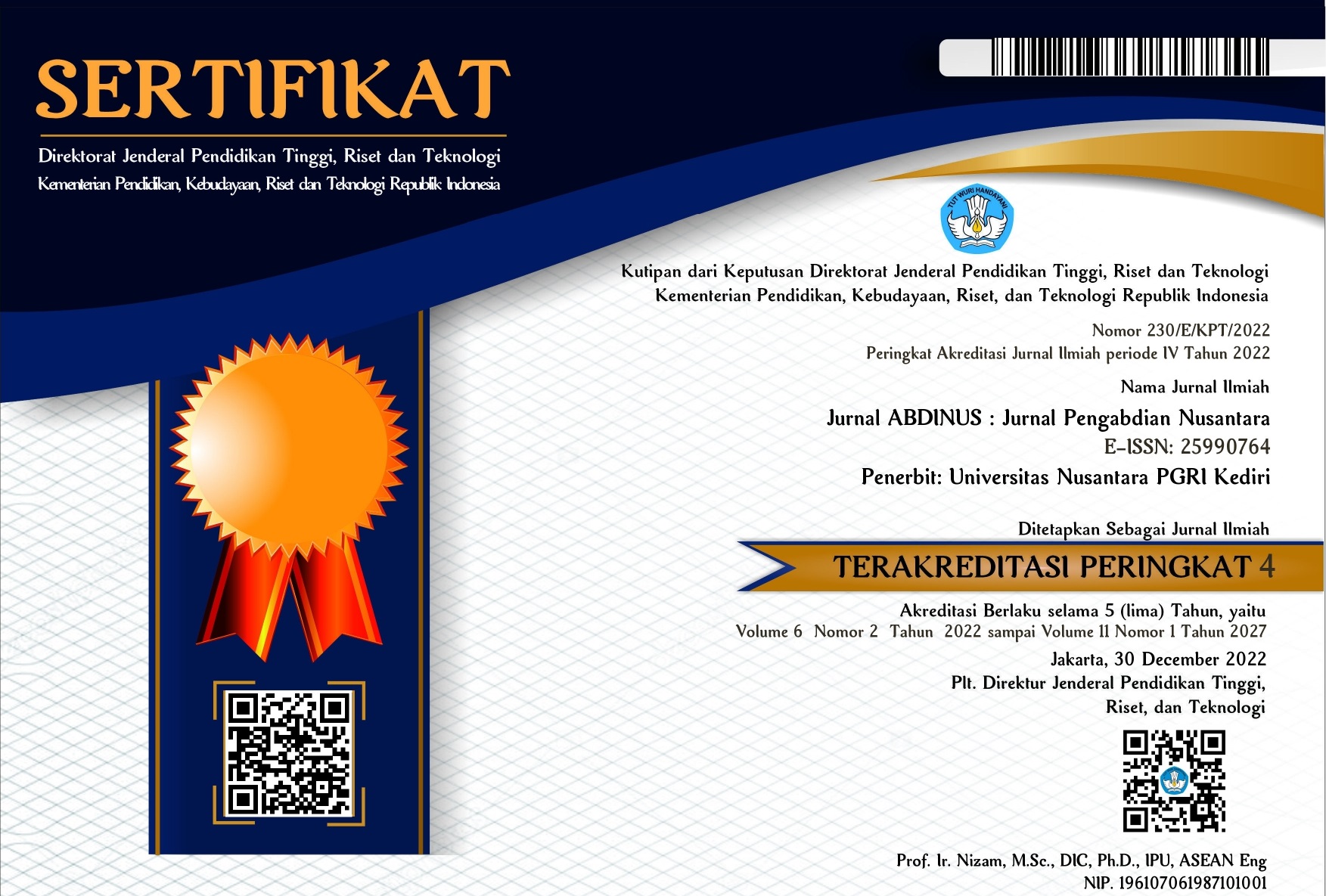Citizen Forum on Participatory Planning and Budgeting to Promote the Inclusive Village Governance
DOI:
https://doi.org/10.29407/ja.v6i1.16845Keywords:
Village, Inclusion, Participation, Budgeting, Planning.Abstract
After 23 years of reformation, one of the regulatory products that reflect the devolution and delegation of decentralized development management authority to the local government is Law No. 6/2014 on Villages which promises further community involvement, by placing the village as the centre of regional development and not only as an object of the national programs. This citizen forum facilitation was held in the context of expanding understanding of the substance of participatory planning and budgeting and the significance of community involvement in the village development management which was carried out during August 2021 in the Bajo Village, Soromandi District, Bima Regency, West Nusa Tenggara Province by involving dozens of people, especially women's groups, as participants. The main methods applied during this facilitation to discuss everything related to the prospects, constraints, and substantive needs of the program were in the form of lectures, brainstorming, practise, and mentoring. The group of women who participated on average emphasized that they were not citizens who had been involved and in the village planning-budgeting deliberations that had been held there. They have never experienced the atmosphere of regular civic forums such as the Musdes and the Musrenbangdes to discuss the draft of the RPJMDesa, the RKPDesa, and the APBDesa documents because there was no access and an opportunity to voice their collective needs to the Village Government. The activity output showed that there has been a seed of collective awareness from all participants to take a role in the planning-budgeting forums for the coming year and utilize them as a medium for channelling their aspirations, interests, or needs to the Village Government and the BPD. They were very aware of the various priority needs that must be fought for their articulation, both directly and through the intermediary of the Village Community Institution managers.
Downloads
References
________. (2004b). Civic Engagement in Local Government Renewal in Indonesia. In Antlov, H. et al., Citizen Participation in Local Governance: Experiences from Thailand, Indonesia, and the Philippines (139-171). Manila: IPD for Logolink Southeast Asia.
Antlov, H. (2003b). Not Enough Politics! Power, Participation and the New Democratic Polity in Indonesia. In Aspinall, E. & Fealy, G. (eds.). Local Power and Politics in Indonesia. Singapore: Institute of Southeast Asian Studies.
Antlov, H., Wetterberg, A. & Dharmawan, L. (2016). Village Governance, Community Life, and the 2014 Village Law in Indonesia. Bulletin of Indonesian Economic Studies, 52(2), pp. 161-183. DOI: 10.1080/00074918.2015.1129047
Barter, S. J. (2013). The Danger of Decentralization: Clientelism, the State, and Nature in a Democratic Indonesia. Working Paper. The University of British Columbia, pp. 1-15.
Department of Economic and Social Affairs (DESA). (2005). Participatory Planning and Budgeting at the Sub-National Level. Manila-Philippines: United Nation publication.
Fung, A., & Wright, E. O. (2003). Deepening Democracy: Institutional Innovations in Empowered Participatory Governance. London and New York: Verso.
Hidayat, H. (2016). Forest Resources Management in Indonesia (1968-2004): A Political Ecology Approach. London: Springer. https://doi. org/10.1007/978-981-287-745-1.
Hidayat, R., Hendra, H., & Iptidaiyah, M. (2019). The Steep Road to Institutionalizing Negotiable Governance in the Management of Village Development. Journal of Governance, 4(1), pp. 45-67. DOI: http://dx.doi.org/10.31506/jog.v4i1.5369
Hikmawan, M. D. & Hidayat, R. (2016). Depoliticisation of Public Issue: Low Degree of Government's Democratic Legitimacy (The Case of the Reclamation Policy of Benoa Bay, Bali, Indonesia). Journal of Governance, 1(1), pp. 27-41.
Indriyany, I. A., Hikmawan, M. D., Godjali, M. R., & Mahpudin. (2021). Environment Development Based on Local Community, Case of “Relawan Kampung,” Banten, Indonesia. E3S Web of Conferences, 277, pp. 1-8.
Kessa, W. (2015). Buku 6: Perencanaan Pembangunan Desa. Jakarta: Kementerian Desa Pembangunan Daerah Tertinggal, dan Transmigrasi Republik Indonesia.
Lay, C. (2012). Democratic Transition in Local Indonesia: An Overview of Ten Years Democracy. Jurnal Ilmu Sosial dan Ilmu Politik (JSP), 15(3), pp. 207-219.
Permendagri No. 114 Tahun 2014 tentang Pedoman Pembangunan Desa.
Permendesa No. 2 Tahun 2015 tentang Tata Tertib dan Mekanisme Pengambilan Keputusan dalam Musyawarah Desa.
Sugiharta, S. (2012). Desentralisasi dan Sumberdaya Aparatur: Problematika Pelaksanaan Desentralisasi Pelestarian Cagar Budaya di Provinsi Sumatera Barat, Riau, dan Kepulauan Riau. Jurnal Ilmu Sosial dan Ilmu Politik (JSP), 15(3), pp. 232-245.
Undang-Undang No. 6 Tahun 2014 tentang Desa.















